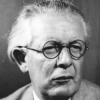Jean Piaget

Jean Piaget
Jean Piagetwas a Swiss clinical psychologist known for his pioneering work in child development. Piaget's theory of cognitive development and epistemological view are together called "genetic epistemology"...
NationalitySwiss
ProfessionScientist
Date of Birth9 August 1896
CityNeuchatel, Switzerland
CountrySwitzerland
religious mean animal
For the fundamental fact of human psychology is that society, instead of remaining almost entirely inside the individual organism as in the case of animals prompted by their instincts, becomes crystallized almost entirely outside the individuals. In other words, social rules, as Durkheim has so powerfully shown, whether they be linguistic, moral, religious, or legal, etc., cannot be constituted, transmitted or preserved by means of an internal biological heredity, but only through the external pressure exercised by individuals upon each other.
mean reality knowing
Knowing reality means constructing systems of transformations that correspond, more or less adequately, to reality.
strong mean support
This means that no single logic is strong enough to support the total construction of human knowledge.
mean self expression
True interest appears when the self identifies itself with ideas or objects, when it finds in them a means of expression and they become a necessary form of fuel for its activity.
teaching mean creating
Teaching means creating situations where structures can be discovered.
children mean people
Education, for most people, means trying to lead the child to resemble the typical adult of his society . . . but for me and no one else, education means making creators. . . . You have to make inventors, innovators...not conformists
capable create education goal inventive men principle repeating simply
The principle goal of education is to create men who are capable of doing new things, not simply of repeating what other generations have done -- men who are creative, inventive and discoverers.
capable creating creativity critical education goal inventive men principal repeating schools simply women
The principal goal of education in the schools should be creating men and women who are capable of doing new things, not simply repeating what other generations have done; men and women who are creative, inventive and discoverers, who can be critical and verify, and not accept, everything they are offered.
aggregate built connected objective objects permanent placed relations subject time
From this time on, the universe is built up into an aggregate of permanent objects connected by causal relations that are independent of the subject and are placed in objective space and time.
call objects refer second shall term type using
The first type of abstraction from objects I shall refer to as simple abstraction, but the second type I shall call reflective abstraction, using this term in a double sense.
actions individual time
On the one hand, there are individual actions such as throwing, pushing, touching, rubbing. It is these individual actions that give rise most of the time to abstraction from objects.
knowledge system
Knowledge, then, is a system of transformations that become progressively adequate.
becomes begins capable child objective practical purely recall starting subjective
We recall how, starting with purely practical and quasi-physiological groups, the child begins by elaborating subjective groups, then arrives at objective groups, and only then becomes capable of representative groups.
children thinking small-numbers
Much research in psychology has been more concerned with how large groups of people behave than about the particular ways in which each individual person thinks... too statistical. I find this disappointing because, in my view of the history of psychology, far more was learned, for example, when Jean Piaget spent several years observing the ways that three children developed, or when Sigmund Freud took several years to examine the thinking of a rather small number of patients.